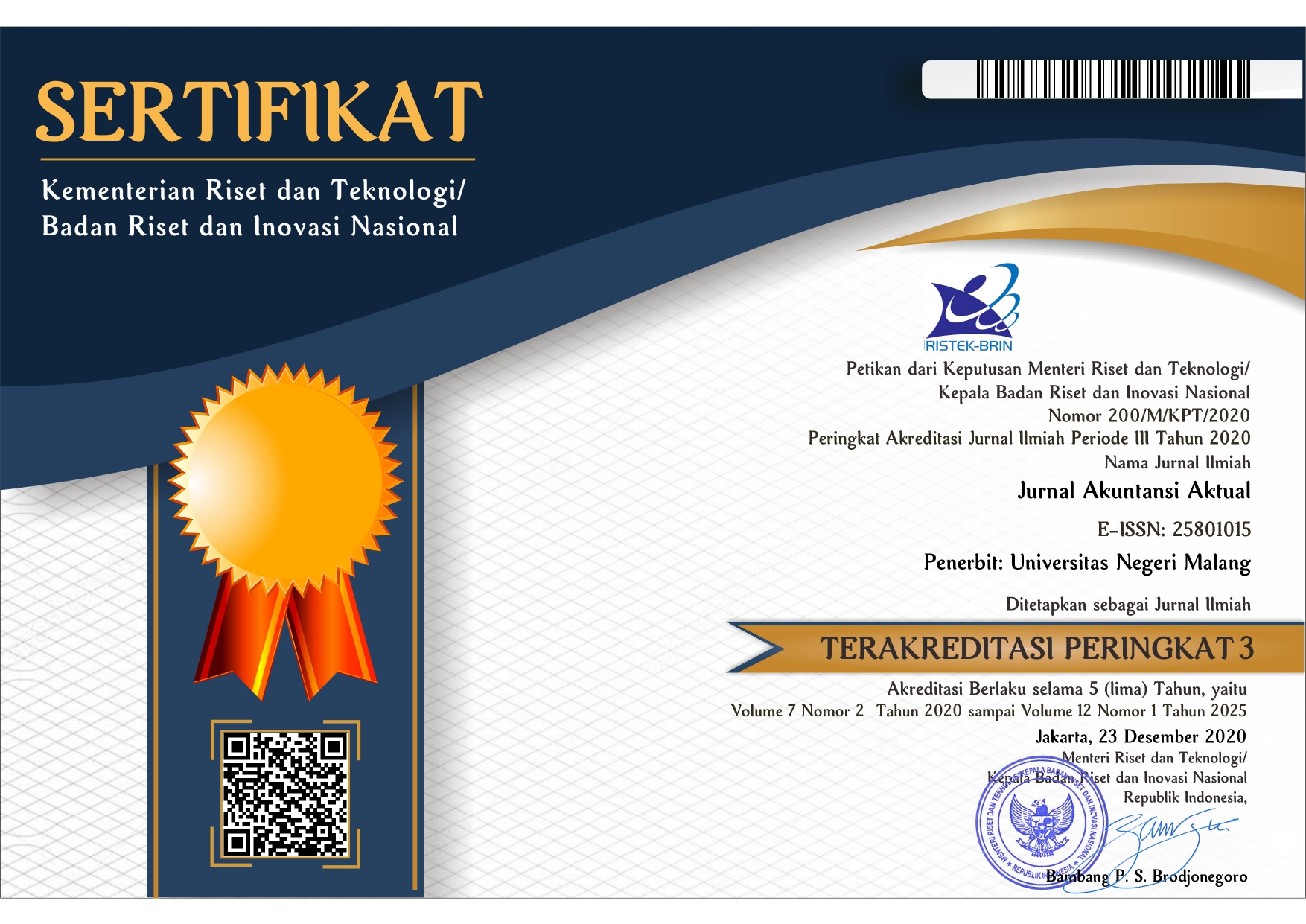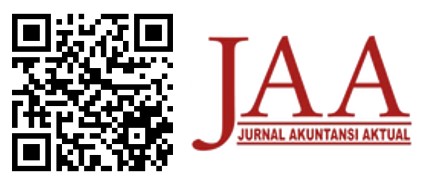Studi Corporate Information Transparency on the Internet (e-CTI) pada Bursa Efek Indonesia, Malaysia dan Singapura
Abstract
Tujuan dari penelitian ini adalah untuk menganalisis pengaruh faktor makro dan mikro terhadap e-CTI di tiga negara yaitu Indonesia, Malaysia, dan Singapura. Alasan pemilihan ketiga negara tersebut karena besarnya investasi asing yang masuk ke Indonesia pada tahun 2017. Adanya kerjasama Indonesia Malaysia Singapura – Growth Triangle (IMS-GT) menyebabkan Singapura dan Malaysia sebagai investor paling dominan di Indonesia. Sampel penelitian adalah 65 perusahaan yang terdaftar di indeks paling likuid pada ketiga bursa efek. Hasil penelitian membuktikan jika banyaknya dewan direksi ternyata berpengaruh positif pada e-CTI. Karena adanya lebih banyak dewan direksi akan meningkatkan kemampuannya dalam mendorong manajemen untuk lebih transparan. Hal ini didorong dengan tugas dan tanggung jawab dewan direksi terhadap pemegang kepentingan yang tertera pada peraturan ketiga negara. Adanya revolusi industri 4.0 merupakan faktor lain yang memudahkan dewan direksi dalam memenuhi tanggung jawab dan tugasnya
The purpose of this study is to analyze the influence of macro and micro factors on e-CTI in three countries namely Indonesia, Malaysia, and Singapore. The reason for the selection of the three countries was due to large foreign investment entering Indonesia in 2017. The agreement of Indonesia Malaysia Singapore –Growth Triangle (IMS-GT) made Singapore and Malaysia as the most dominant investors in Indonesia. The research sample consist of 65 companies listed on the most liquid indexes on the three stock exchanges. The result showed that the total board of directors had a positive effect on e-CTI. It concludes that the existence of more boards of directors will increase its ability to encourage management to be more transparent. This is driven by the duties and responsibilities of the board of directors stated in the regulations of the three countries. The existence of a industrial revolution 4.0 is another factor that facilitates the board of directors in fulfilling their responsibilities and duties.
Keywords
Full Text:
PDFReferences
Abdillah, M. R. (2015). Pengaruh Karakteristik Dewan Komisaris Terhadap Pengungkapan Internet Financial Reporting (IFR). Dinamika Ekonomi Jurnal Ekonomi dan Bisnis, 8(1), 53-70.
Agoes, S., & Ardana, I. C. (2014). Etika Bisnis dan Profesi. Jakarta: Salemba Empat.
Akhtaruddin, M., Hossain, M. A., Hossain, M., & Yao, L. (2009). Corporate Governance and Voluntary Disclosure in Corporate Annual Reports of Malaysian Listed Firms. Journal of Applied Management Accounting and Research, 7(1), 1-20.
Anggraita, V. F., & Syafiqurrahman, M. (2013). Transparansi Informasi Perusahaan Berbasis Internet (e-CTI) Pada Perusahaan yang Terdaftar di China (SSE50), India (NIFTY), dan Indonesia (LQ45). Simposium Nasional Akuntansi XVI, 514-538. Manado.
Archambault, J. J., & Archambault, M. E. (2003). A Multinational Test of Determinants of Corporate Disclosure. The International Journal of Accounting, 38, 173-194.
Askary, S., Punder, J. S., & Yazdifar, H. (2008). Influence of Culture on Accounting Uniformity Among Arabic Nations. Education, Business ,and Society: Contemporary Middle Eastern Issues, 1(2), 145-154.
BKPM. (2017, December 1). https://databoks.katadata.co.id/. https://databoks.katadata.co.id/datapublish/2017/12/01/inilah-10-negara-dengan-investasi-terbesarke-indonesia-2017: https://databoks.katadata.co.id/datapublish/2017/12/01/inilah-10-negara-dengan-investasi-terbesarke-indonesia-2017
Boediono. (1985). Teori Pertumbuhan Ekonomi. Yogyakarta: BPFE.
Bonson, E., & Escobar, T. (2002). A Survey on Voluntary Disclosure on the Internet. Empirical Evidence from 300 European Union Comapnies. The International Journal of Digital Accounting Research, 2(1), 27-51.
Breliastiti, R., & Giam, H. S. (2015). Pengaruh Ukuran Perusahaan, Leverage, dan Tipe Industri Terhadap Corporate Information Transparency on The Internet (e-CTI) Perusahaan LQ45. Jurnal Akuntansi Bisnis, 8(2), 1-31.
Cahyono, Y. T. (2003). Pengaruh Inflasi terhadap Pelaporan Keuangan. Jurnal Akuntansi dan Keuangan, 2(2), 141-150.
Campbell, J. L. (2006). Institutional Analysis and The Paradox of Corporate Social Responsibility. American Behavioral Scientist, 49(7), 925-938.
Chaudhuri, S., & Mukhopadhyay, U. (2014). Foreign Direct Investment in Developing Countries: a Theoretical Evaluation. India: Spinger.
Elfeky, M. I. (2017). The Extent of Voluntary Disclosure and Its Determinants in Emerging Markets: Evidence From Egypt. The Journal of Finance and Data Science, 3(1), 45-59.
Erer, M., & Dalgic, O. M. (2011). The Impact of Corporate Governance on Internet Financial Reporting: Evidence from Turkey. International Journal of Business Research, 11(3).
Fikrisani, M., & Cahyonowati, N. (2015). Analisis Faktor Yang Mempengaruhi Tingkat Pengungkapan Internet Corporate Reporting. Diponegoro Journal of Accounting, 4(3), 1-10.
Friedman, M. L. (1969). The Legal System: a Social Science Perspective. New York: Russel Soge Foundation.
Gandia, J. L. (2008). Determinants of Internet – Based Corporate Governance Disclosure by Spanish Listed Companies. Online Information Review, 32(6), 791-817.
Harsono, M. (2002). Prosedur Pengujian Variabel Kontrol dan Moderator Dalam Penelitian Perilaku Dengan Menggunakan SPSS 10.00. Jawa Tengah: Universitas Sebelas Maret.
Hashim, A. H. (2012). The Influence of Culture on Financial Reporting Quality in Malaysia. Asian Social Science, 8(13), 192-200.
Hofstede, G., Hofstede, G. j., & Minkov, M. (2010). Cultures and Organizations: Software of the Mind. New York: Mc Graw Hill.
Holthausen, R. W. (2009). Accounting Standards, Financial Reporting Outcomes, and Enforcement. Journal of Accounting Research, 47(2), 447-458.
Idris, M. (2020, 02 24). Singapura Pernah Tolak Label Sebagai Negara Maju di WTO. https://money.kompas.com/read/2020/02/24/133729826/singapura-pernah-tolak-label-sebagai-negara-maju-di-wto?page=2
Jaggi, B., & Low, P. (n.d.). Impact of Culture, Market Forces, and Legal System on Financial Disclosures. The International Journal of Accounting, 35(4), 495-519.
Kasmir. (2012). Analisis Laporan Keuangan. Jakarta: Raja Grafindo.
Kieso, E., Weygandt, J. J., & Warfield, T. D. (2017). Akuntansi Keuangan Menengah (Intermediate Accounting) (Edisi IFRS). Jakarta: Salemba Empat.
Lington, R. (1984). Antropologi: Suatu Penyelidikan Tentang Manusia. Bandung: Jemars.
Mir, M. Z., Chatterjee, B., & Rahaman, A. S. (2009). 2009. Culture and Corporate Voluntary Reporting, 24(7), 639-667.
Munawir, S. (2015). Analisis Laporan Keuangan. Jakarta: Salemba Empat.
Normala, A. (2018, Januari 31). https://jakartaglobe.id. Retrieved September 5, 2019, from https://jakartaglobe.id. Indonesia Attracts Foreign Direct Investments 2017: https://jakartaglobe.id. Indonesia Attracts Foreign Direct Investments 2017
Novius, A. (2019). Faktor-Faktor yang Mempengaruhi Ketepatan Waktu Corporate Internet Reporting dalam Mendukung Transparansi Keuangan pada Perusahaan yang Terdaftar di Bursa Efek Indonesia. Fokus Ekonomi: Jurnal Ilmiah Ekonomi, 14(1), 59-78.
Nur, E. M. (2012). Konsumsi dan Inflasi Indonesia. Jurnal Kajian Ekonomi, 1(1), 55-77.
Nurfadilah, W., & Sagara, Y. (2015). Pengaruh Good Corporate Governance, Karakteristik Perusahaan dan Regulasi Pemerintah Terhadap Pengungkapan Corporate Social Responsibility. Akuntabilitas, 8(1), 78-89.
Ojah, K., & Mokoteli, T. M. (2012). Internet Financial Reporting, Infrastructures and Corporate Governance: An International Analysis. Review of Development Finance, 2(2), 69-83.
Othman, R., Thani, A. M., & Ghani, E. K. (2009). Determinants of Islamic Social Reporting among Top Shariah-Approved Companies in Bursa Malaysia. Research Journal of International Studies, 12(10), 4-20.
Ousama, A. A., & Fatimah, A. H. (2010). Factors Influencing Voluntary Disclosure: Empirical Evidence from Shariah Approved Companies. Malaysian Accounting Review, 9(1), 85-103.
Puspitaningrum, D., & Atmini, S. (2012). Corporate Governance Mechanism and the Level of Internet Financial Reporting: Evidence from Indonesian Companies. Procedia Economics and Finance, 2, 157-166.
Salleh, K., Hamid, N. A., Harun, N., Bidin, A., & Ghadas, Z. A. (2017). The Independent Directors in Malaysia: The Analysis of the Legal Requirement for Conventional and Shariah Business Companies. World Applied Sciences Journal, 35(9), 1737-1741.
Samaha, K., & Abdallah, S. (2011). Further Evidence on Web-based Corporate Dosclosures in Developed Versus Developing Countries: A Comparative Analysis of Nature and Determinants in Egypt and The United Kingdom. International Journal of Disclosure and Governance, 9(2), 148-180.
Schumpeter, J. (1934). The Theory of Economic Development. An Inquiry into Profits, Capital, Credit, Interest and the Business Cycle. USA: Harvard.
Sukirno, S. (2013). Makro Ekonomi, Teori Pengantar. Jakarta: PT Raja Grafindo Persada.
Suwardjono. (2014). Teori Akuntansi Perekayasaan Pelaporan Keuangan (3 ed.). Yogyakarta: BPFE.
Taman, A., & Nugroho, B. A. (2012). Determinan Kualitas Implementasi Corporate Governance pada Perusahaan yang terdaftar di Bursa Efek Indonesia periode 2004-2008. Jurnal Pendidikan Akuntansi Indonesia, 9, 1.
Turrent, G. B., & Ariza, L. R. (2012). Corporate Information Transparency on the Internet by Listed Companies in Spain (IBEX35) and Mexico (IPYC). The International, 12, 1-37.
Utomo, B. (2009). Geografi Membuka Cakrawala Dunia 3. Jakarta: Pusat Perbukuan Departemen Pendidikan Nasional.
Wiwin. (2017). Studi Corporate Information Transparency on The Internet (e-CTI) Pada Bursa Efek Thailand, Singapura, Malaysia, dan Indonesia. Parsimonia, 3(3), 68-87.
Zarkasyi, M. W. (2008). Good Corporate Governance Pada Badan Usaha Manufaktur, Perbankan, dan Jasa Keuangan Lainnya. Bandung: Alfabeta.
DOI: http://dx.doi.org/10.17977/um004v7i22020p107
Refbacks
- There are currently no refbacks.

This work is licensed under a Creative Commons Attribution-ShareAlike 4.0 International License.
Jurnal Akuntansi Aktual is indexed by:















